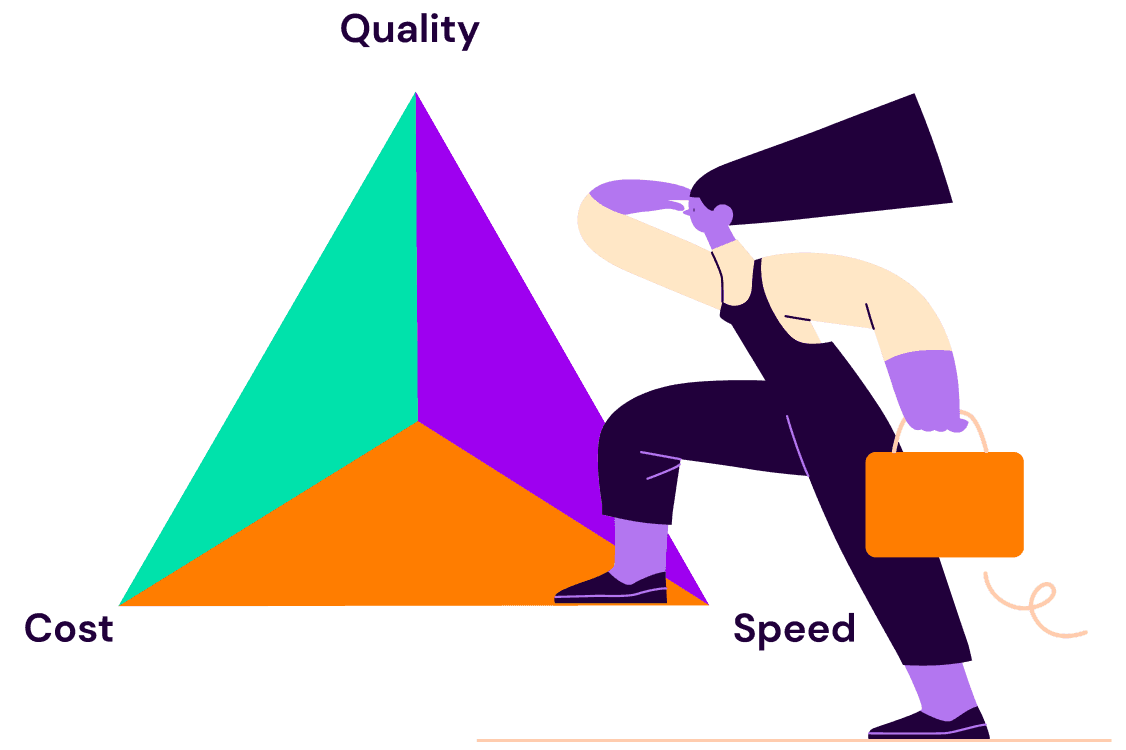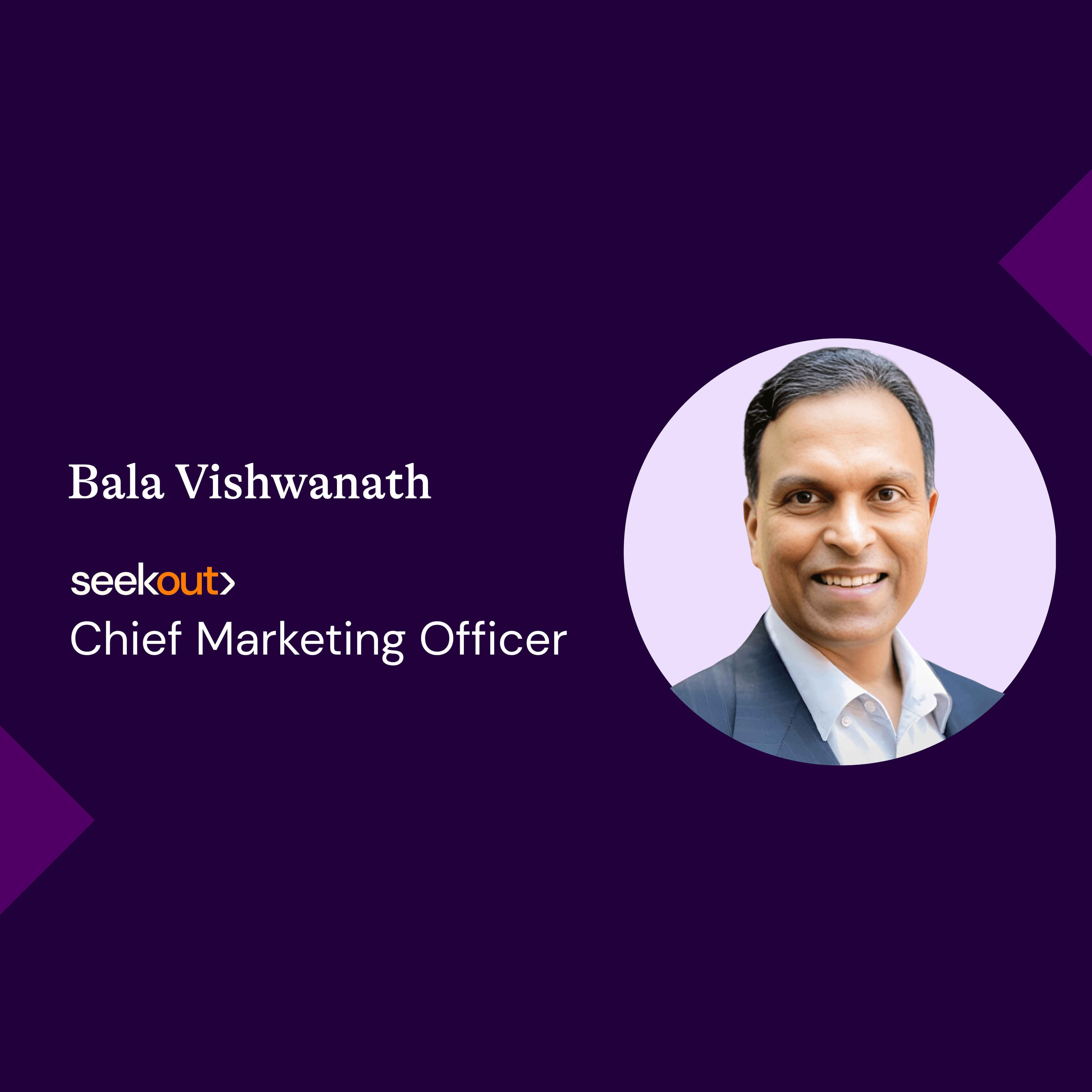
Back to blogs
Reviewed by: Christina Vidauri, Principal Technical Recruiter at SeekOut
Asking the right candidate interview questions is essential to hiring someone who not only has the required skills and experience but also whose career aspirations match what your organization can offer. You have a short amount of time to speak with someone, so your questions should yield answers that reveal two things: One, how successful the candidate will be in the role, and two, how the candidate’s goals, interests, communication skills, and values line up with your organization.
To get you started, below are 15+ strategic interview questions to ask candidates throughout various stages of the interview process, whether you're a recruiter or a member of the hiring team.
Download this list: Strategic Interview Questions to Ask Candidates PDF
The type of questions you ask a candidate will depend on the role (i.e., what you ask a software engineer will be quite different than what you ask a marketing manager). However, you can ask non-role-specific questions to help you better understand the candidate’s approach to work and the general skills they possess (e.g., problem-solving skills and communication).
To compile this list of questions to ask a candidate in an interview, we asked two SeekOut recruiters for their favorites, and we got some help from Laszlo Bock, former Google Senior Vice President of People Operations. You’ll also find a few questions submitted by our talent community.
Why becoming a strategic recruiter is so essential in 2025
Download the reportStrategic questions to assess role and company alignment
The following are good interview questions to ask a candidate at the beginning stages of the process. These are commonly asked by the recruiter during the screening stage, but anyone throughout the interview loop will find these helpful.
1. Can you walk me through your experience at a high level?
Why this question is strategic. "This question seems straightforward, but candidates can struggle telling their story and how it relates to the role they are interviewing for," says Andy Pietromonaco, former Senior Recruiter at SeekOut. "This question assesses how well-versed the candidate is in their field, how much research they have done about the company and the role, and how well they can craft their response to an audience."
What to look for in a candidate’s answer. Andy says to listen for the candidate’s ability to concisely provide a career summary. They should be able to highlight bullet points of their experience and directly align them with what's listed in the job description.
2. What piqued your interest about this opportunity?
Why this question is strategic. This is one of the best interview questions to ask candidates because it reveals if they took the time to review the company website and job description.
"If they are unable to articulate why they want the job at your company, it will create issues during the offer stage," says Andy. "It's possible they may be overlooking details of the role itself and solely looking at the compensation package."
What to look for in a candidate’s answer. They should understand what the organization does at a surface level and why it inspired them to apply. They should also be able to describe why the role is compelling based on their experience and current situation (i.e., they went through a layoff, they’re looking for something new, they want a chance to advance their career, etc.).
3. What are you looking for in your next role and what will you be assessing about our organization?
Why this question is strategic. This offers an opportunity to address why your organization is a good fit for the candidate based on what they’re looking for. If you’re a recruiter asking this question, you can take the candidate’s answer to the hiring team so they can address these points in the interview.
"Interviewing is a two-way street," says Christina Vidauri, Principal Technical Recruiter at SeekOut. "You want the candidate to learn as much as possible about your organization and ensure all their questions are answered throughout the process."
What to look for in a candidate’s answer. There are no right or wrong answers, but concerns may arise if they don’t mention anything related to the company values, culture, or role.
"They may be looking for any job, not necessarily one with your organization," Christina says. "As a recruiter, you can take this context to internal stakeholders about extending the offer to the candidate."
4. What are your compensation expectations given what you’ve learned about the role so far?
Why this question is strategic. This is among the most basic interview questions to ask candidates if you’re the recruiter or hiring manager. "I want to have a transparent conversation up front," says Christina. "This question is not about pinning down a number. Instead, it allows me to determine if we’re within range and explain the organization's compensation philosophy and structure."
What to look for in a candidate’s answer. A candidate who has done appropriate market research will provide a reasonable range and some flexibility in terms of factoring in your organization’s benefits and equity (if applicable).
Strategic interview questions to ask candidates about their workplace experience
These candidate interview questions will help you determine how well they might transition into the new role based on their current work situation.
15 Interview Questions for Internal Candidates
Read the list5. What kind of technology have you used in your most recent role and how have you used it?
Why this question is strategic. If you have a specific technology in mind (e.g., Salesforce, Tableau, SQL, Python, etc.), you can tailor this question to that product specifically. However, it's crucial to also ask how they’ve used the product.
"You’ll learn in depth how they've applied their technical skills and knowledge of a product in a professional setting," Andy says. "You can’t determine if they’re a good fit only by knowing if they’ve used it."
What to look for in a candidate's answer. Listen for specific application of the technology, not blanket statements about their experience. Examples may include a project they worked on, a day-to-day use case, and how involved they were (i.e., basic data entry, system admin, expert user).
6. What type of work have you enjoyed the most so far?
Why this question is strategic. This question is for new graduates or those seeking internship roles. "Candidates who are in the early stages of their career may not yet know where to place their focus professionally," says Christina. "Learning what they’ve enjoyed doing and why may help you understand the best opportunity for them within your organization."
What to look for in a candidate’s answer. Their response should be honest and enthusiastic. It’s OK if they carried out a project that focused on one thing but want to explore a project focusing on something else. Their answer should show they are willing to try new things and seek help when they need it.
7. Could you describe the team you work with right now?
Why this question is strategic. You’ll learn about the candidate's most recent work environment, including the size of their team and the roles and titles within. They may be working at a large company with defined roles and processes or at a smaller company where employees wear different hats and processes aren’t as solidified.
What to look for in a candidate’s answer. Christina advises that your aim is to understand how well they could transition to your organization if you offer a different environment than they’ve described.
Behavioral interview questions to ask candidates
Behavioral questions are some of the best interview questions to ask candidates because they focus on their response to a specific, real-life situation. These can also double as personality interview questions to ask candidates since the answers will give you a view into how they manage things like stress, roadblocks, or conflict.
8. Tell me about an especially difficult problem you had to solve.
Why this question is strategic. “Work Rules!” author Laszlo Bock says this is his favorite question to ask candidates and he uses it in every interview. "It gives me a sense of their general cognitive ability, which is known to predict 27% of job performance. It's the biggest single predictor," says Laszlo. "I also get meta information about how hard somebody thinks the problem was."
What to look for in a candidate's answer. Their answer should tell you how they assessed the challenge, how they found a solution, and how they solved the problem. Ideally, they'll share an example that's not team-based but more specific to their actions as an individual.
9. Tell me about a time you worked on a project under a tight deadline.
Why this question is strategic. This is one of the most effective interview questions to ask because it can reveal several candidate skills, including time management, problem-solving, organization, and team communication.
What to look for in a candidate's answer. They should be able to walk you through a project or task from beginning to end with the steps they took to complete it on time, including how they communicated with the team throughout the process and how they managed unexpected issues that may have occurred.
10. Tell me how you work in a team environment with a variety of priorities and opinions.
Why this question is strategic. You can assess someone’s philosophy on working in a collaborative environment: Are they order-givers? Are they unwilling to speak up when working with others? Are they someone who will be a positive addition to your culture?
What to look for in a candidate's answer: "They should reveal an example showing how they’ve navigated this type of environment in the past or in their current role," says Andy. "Pending the role and responsibilities, you want to know if someone will use their voice but also listen to others and encourage healthy collaboration."
11. Tell me about a time when you had to learn a new skill at work.
Why this question is strategic. You’ll get an idea how proactive the candidate may be on the job when it comes to tackling unfamiliar projects: Are they open to exploring new skills? How do they go about learning something quickly? How do they adapt to tough situations?
What to look for in a candidate's answer. Your aim is to understand whether the candidate is willing to leave their comfort zone and how they approach turning a problem into an opportunity. They should show excitement to try new things and demonstrate how they currently use that skill or what they took away from the experience overall.
Self-awareness questions to ask candidates
This set of strategic interview questions to ask candidates focuses on self-reflection: How well does the candidate know their strengths and weaknesses and how will knowing these qualities help them in this role?
12. What are your areas of opportunity for growth?
Why this question is strategic. "I love this question because it shows me how self-aware the person is and what steps they are taking to improve," says Lainie Marte, HR Senior Talent Acquisition Manager at Best Buy. "You’d be surprised how much this question reveals about the person."
What to look for in a candidate's answer. You’ll learn how willing they are to grow professionally, how they may respond to feedback from managers or team members, and their approach to being action oriented. They should describe their area of growth in detail, not offer something vague.
13. What’s something you believe you do really well?
Why this question is strategic. You’ll gauge the candidate’s confidence in their abilities and determine if their strengths align with responsibilities of the future role.
What to look for in a candidate's answer. Think of this answer as an opportunity for them to show you why they’re the best person for the job. Ideally, they will choose a skill that speaks to a required job responsibility listed in the job posting.
14. What’s a professional accomplishment you’re most proud of?
Why this question is strategic. You’ll gain insight into the candidate’s values, skills, work ethic, and what they consider important in their career.
What to look for in a candidate's answer. Their answer should speak to your organization’s needs and demonstrate skills that are relevant to the role. Listen for specific ways that their greatest accomplishment positively impacted their organization.
15. What are the most important values and ethics that you demonstrate as a leader?
Why this question is strategic. This is a favorite interview question of Kelli Stillwell, Lead Recruiter at IBM. While this is geared more toward managers or executives, you can rephrase this for individual contributor roles as "Tell me about a time that you demonstrated leadership skills." The strategy is the same: You want to get a sense of how the candidate will lead a team or whether they have potential to lead a team in the future.
What to look for in a candidate answer. Candidates should offer the reasons for anything they list along with examples that demonstrate how each has benefited the teams they have led or how it has supported their work.
Bonus: Strategy interview questions
These are good interview questions to ask a candidate who is applying for more strategy-focused roles. You'll identify how they build and lead projects that align with the needs of the business. You'll get insight into their decision-making process and how they include stakeholders.
16. What key factors do you consider when creating an action plan?
Why this question is strategic. Action plans keep teams aligned and on track to meet deadlines. This question will highlight the candidate's organizational and cross-collaboration skills and how well they understand the strategy behind the plan they're creating as it relates to business goals.
What to look for in a candidate answer. Candidates should be able to give an example of a well-executed plan they've recently led and why it was prioritized. They should also take you through how they determined tasks, which teams they looped in and why, and whether or not deadlines were met.
17. Could you tell me about a time you had to influence leadership to adopt a strategic plan?
Why this question is strategic. You'll understand how well they can defend their position and how they ensure leadership is included in the decision-making process.
What to look for in a candidate answer. The candidate should reveal why leadership was hesitant and how they were able to ease doubts using experience, data, or success stories, and how it all aligned with company goals.
18. How do you measure a strategy's effectiveness?
Why this question is strategic. Strategies can't improve without understanding how they performed. You'll learn whether the candidate thinks through strategy-building holistically beyond the launch of a project.
What to look for in a candidate's answer. They may talk about the goals and KPIs that were established from the beginning of the project and any relevant data they gathered to determine whether those targets were met. They should explain how they analyzed the data and whether they included any stakeholders to offer a diverse set of perspectives.
How to ask the most effective interview questions
Once you’ve compiled your list of strategic interview questions to ask candidates, we recommend leaving some space to ask simple follow-up questions. For example, you may want clarification from the candidate by asking:
Why is that?
Why did you decide to go that route?
What was the result?
What challenges did you face with that?
Did it work?
"This tactic is especially useful if people give very concise answers," says Andy. "You don't want to just move on. Instead, make sure you get an answer that offers all the information you need, even if it isn't the ‘right’ answer."
Make 2025 the year you jump from recruiter to strategic talent advisor. Here's how to level up:
See us in action
Learn how SeekOut unifies people data to help organizations reach their talent goals
Request a demo




